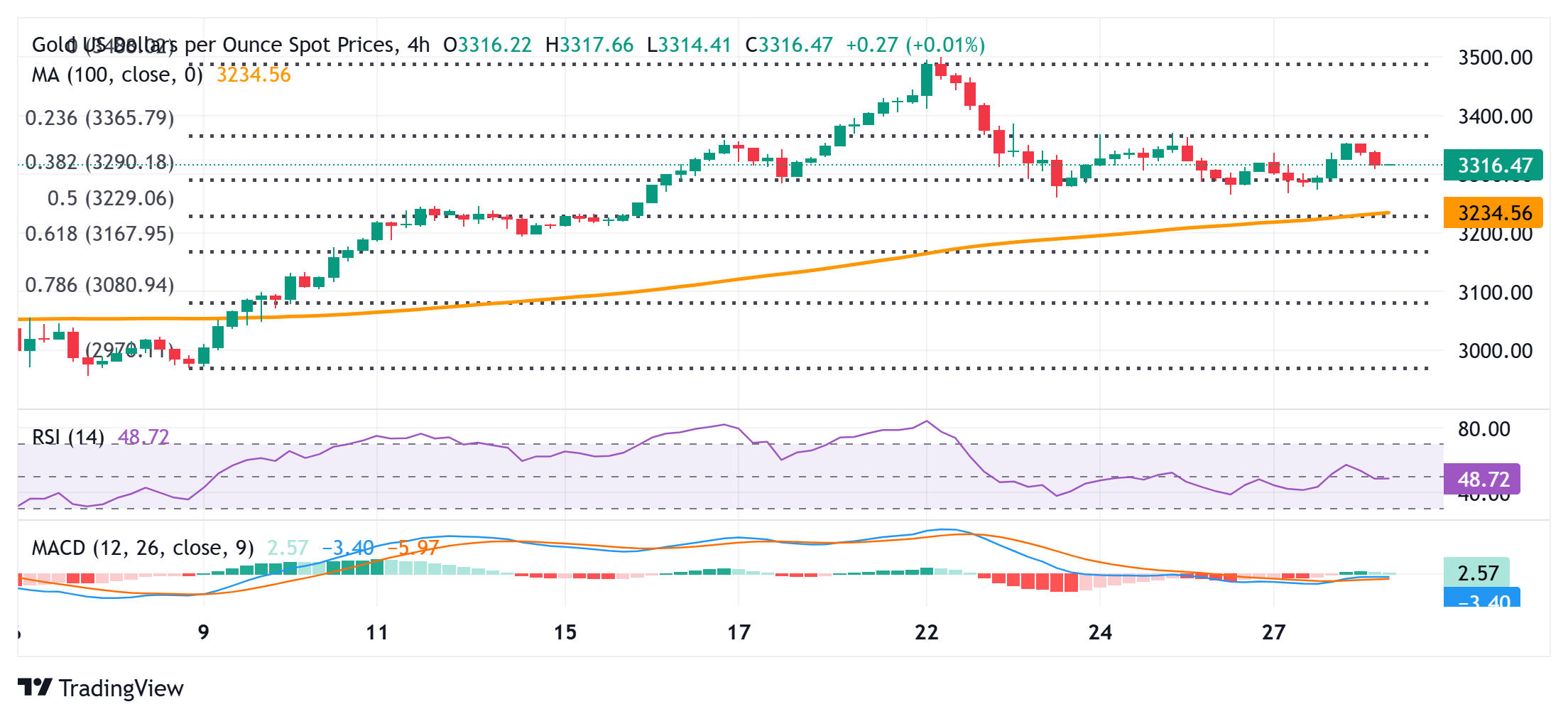
Gold price drifts lower as signs of easing US-China trade tensions undermine safe-haven demand.
The USD reverses a part of the overnight slide and exerts additional pressure on the XAU/USD pair.
Fed rate cut bets might cap the USD and help limit losses for the commodity amid geopolitical risks.
Gold price (XAU/USD) struggles to capitalize on the previous day's bounce from the vicinity of the $3,265-3,260 pivotal support and attracts fresh sellers during the Asian session on Tuesday. Despite mixed signals from the US and China, investors remain hopeful over the potential de-escalation of trade tensions between the world's two largest economies. Furthermore, signs of progress in tariff negotiations add to the optimism, which, in turn, is seen weighing on the precious metal.
Adding to this the emergence of some US Dollar (USD) dip buying exerts some downward pressure on the Gold price. Investors, meanwhile, remain on the edge amid the high risk of a global recession on the back of the uncertainty over US President Donald Trump's trade policies. This, along with persistent geopolitical tensions and prospects for more aggressive policy easing by the Federal Reserve (Fed), might further contribute to limiting the downside for the non-yielding yellow metal.
Daily Digest Market Movers: Gold price is pressured by receding safe-haven demand and a modest USD uptick
China's recent moves to exempt certain US goods from its retaliatory tariffs showed a willingness to de-escalate tensions between the world's two largest economies. Moreover, US Treasury Secretary Scott Bessent said on Monday that many top US trading partners have made "very good" tariff proposals.
Signs of trade progress support the upbeat market mood. Meanwhile, the US Dollar regains traction and drives flows away from the safe-haven Gold price.
Investors, however, remain on the edge on the back of mixed signals regarding the state of negotiations between the US and China. In fact, US President Donald Trump said last week that trade talks with China were underway, though China has denied that any tariff negotiations were taking place.
Meanwhile, traders expect the Federal Reserve to resume its rate-cutting cycle in June. Moreover, the current market pricing indicates the possibility of at least three rate cuts by the end of this year. Lower borrowing costs could help the non-yielding yellow metal to maintain a floor in the near term.
Russian President Vladimir Putin declared a 72-hour unilateral ceasefire in the Ukraine conflict from May 8, though Ukraine’s President Volodymyr Zelensky dismissed the three-day truce. Moreover, North Korea's involvement in the Russia-Ukraine war keeps the geopolitical risk premium in play.
Traders now look forward to the release of the US JOLTS Job Openings data for some impetus later this Tuesday. Apart from this, US Personal Consumption Expenditures on Wednesday, and the Nonfarm Payrolls (NFP) report on Friday could provide a fresh insight into the Fed's policy outlook.
Gold price bears need to wait for acceptance below the 38.2% Fibo. and a breakdown through $3,265-3,260 support

Weakness below the $3,300-3,290 area, representing the 38.2% Fibonacci retracement level of the latest leg up from the vicinity of mid-$2,900s or the monthly swing low, might continue to find decent support near the $3,265-3,260 horizontal zone. A convincing break below the latter will be seen as a fresh trigger for bearish traders and set the stage for an extension of the recent pullback from the all-time peak touched last week. The subsequent downfall could drag the Gold price to the 50% retracement level, around the $3,225 region, en route to the $3,200 mark.
On the flip side, the $3,348-3,353 region now seems to have emerged as an immediate hurdle. This is closely followed by the $3,366-3,368 supply zone, which if cleared decisively should allow the Gold price to reclaim the $3,400 mark. The momentum could extend further toward the $3,425-3,427 intermediate hurdle before bulls make a fresh attempt to conquer the $3,500 psychological mark.
* The content presented above, whether from a third party or not, is considered as general advice only. This article should not be construed as containing investment advice, investment recommendations, an offer of or solicitation for any transactions in financial instruments.


